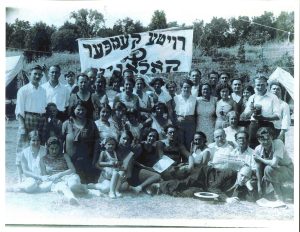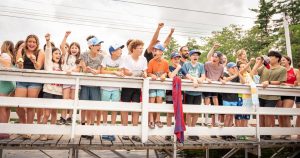Imagine if you took over the family business, but instead of walking the factory floor as the boss’s son or daughter, you went to work in the place where you grew up and maybe fell in love, surrounded by acres of lakefront and forest and supervising dozens of teenage employees.
That’s the job description for the directors and owners of some of Ontario’s oldest private summer camps, who now run the camps that their parents started five or six decades ago.
But summer camps, with their layers of cherished traditions and legendary directors, are not run and passed down quite like other family businesses.
“The passion and love for camp that I grew up with and now I see in my kids, it’s so hard to imagine how deep it runs in our blood, we just love it,” said Adam Kronick, the owner and director of Camp White Pine in Haliburton, Ont. “Since birth, it’s all I’ve known and when I see it in my kids, the love they have for camp, it’s truly remarkable.”
Kronick worked alongside his father, Joe, who started the camp in 1956, for many years. His wife, who he met at camp, and two of his three adult children are working there, as well.
Kronick said there was no pressure, but “there was never any doubt” in his mind that he would eventually run the camp that his father, who died earlier this year, built.
For the Kronick family, as with many other camp families, the transition from one generation to the next was gradual, with the younger generations starting first as campers and then moving on to become counsellors and program directors.
“In any second-generation business, there are so many challenges: you’re working with your parents, in my case my father, and you have to navigate that and develop a sense of autonomy and that takes many years,” Kronick said.
“Working with my dad was always great, he challenged me … he gave me the room to grow and learn on the job.”
READ: CHOOSING A SUMMER CAMP – PART ONE
Summer camp is a business, but it’s also an extended family, said Bruce Nashman, who took over Camp Wahanowin, which was started by his father Harold and grandmother Anne Nashman.
“The people that attend the camp, or attended the camp in the past, they feel very connected, like it’s their place,” he said. “It’s kind of unique that your camp family is not just your immediate family and the people that are owning and directing the camp, it’s the entire community that attends the camp is part of that family.”
Nashman is one of five children, but as they all grew older, it became evident that he was most likely to continue the camp, which is located in Orillia, Ont., and is now in its 65th year.
Nashman said that at first he was torn between carrying on the family business, which felt a bit like “nepotism,” or going out on his own. But he realized he could put his own stamp on it.
“I could expand the business, take it to a new level and I could make it my own flavour, (while) still maintaining the traditions and honouring what my parents and my grandmother started,” he said.
“There’s pride that you’ve been able to continue this legacy that was started by your parents, to keep it in the family is a really nice feeling.”
Sari Grossinger also grew up at camp. Her parents, Larry and Pearl Bell, owned Camp Robin Hood, a Toronto-based day camp that started in 1946 and the Bell family purchased in the early 1960s.
“It was always my life’s dream” to be the camp director, she said, but her parents were clear about one thing: summer camp was a luxury and their children needed to find a second, more reliable career.
She earned a degree as an occupational therapist and worked in schools during the year and at camp over the summer for years, before working at Robin Hood full time.
Her parents are still involved in the camp: her father helps with the transportation, while her mother, who started as the camp nurse, manages a garden and teaches campers healthy habits, such as washing their hands and applying sunscreen.
Camp is an extended family business, with Grossinger’s kids now working at Robin Hood, as well. Her husband’s brother and sister both met their spouses when they were working at camp and she served as counsellor to her future sister-in-law.
“It is different than a traditional business. We always say camp is more than a business, we’re looking after other people’s children,” she said. “There’s a personal side to it, we’re living in the community with many of the families that have grown up in our camp setting. Because we’re the oldest private day camp in Canada, we’re continually bumping into next generations of families. We’re seeing people throughout the year and able to relive the joys of camp.”
Zack Goodman, the assistant director of Camp New Moon in Baysville, Ont., is poised to be the third generation to run the camp.
Zack Goodman’s grandfather, Al, started the camp, which is celebrating its 60th anniversary this summer, and today, his father Jack is the director.
Handing over the management of the camp is a “slow and seamless transition,” said Jack Goodman, who gradually took over the camp the same way from his father 25 years ago.
Working with a parent or child to eventually run the camp is very different than selling it to an outsider, he said.
“When it’s your son or your daughter, you want both the camp to be successful and for them to be successful and to be happy, so there’s much more at stake.”
Like other camp kids, Zack Goodman, 30, grew up at camp and met his wife there. During the year, he works as a kinesiologist, but his true love is being at camp.
“Looking toward the future, the challenge is living up to the expectation and success that both my father and my grandfather had, running great camps that kids grew up in and loved for so many years,” he said. “For me, I’d love to be able to leave the legacy that I was able to do the same thing.”






